Call Me Miss Cleo: What We Can Learn From the TV Psychic
With the recent release of HBOMax's documentary 'Call Me Miss Cleo,' there's been a renewed interest in the TV psychic. During the late 90s and early 2000s, you couldn't turn on the television without seeing her commercials. She'd hold a mock reading, tell some paid actress that she was being cheated on by her husband, and shout, 'Call me now!'
It was all so ridiculous. At that time, we had all heard about 1-800 and 1-900 number scams. There were sex phone operators, information hotlines, paid horoscopes in the form of prerecorded messages--even celebrities like Corey Feldman and Hulk Hogan who'd claim to come on the line for only $5 a minute. Nobody actually took these commercials seriously. They were the equivalent of a Nigerian prince or a random man hitting you up in your DMs. We knew better, and we were all very aware that some of these hotlines were capable of charging your phone bill directly; others would steal your credit card number and charge you without your permission. People would get strange bills and letters, accusing them of fraud, often threatening to sue. Some had never even considered calling one of these scam artists, but somehow or other, they found themselves in their crosshairs. Miss Cleo was no different.
The company she worked for, the Psychic Readers Network (PRN), latched on to a fad that began in the late 80s and early 90s. Psychic hotlines would pay celebrities like Latoya Jackson and Tori Spelling to film lengthy infomercials where actors would pretend to be shocked during readings. They'd gasp and cry out like they'd actually encountered real psychism. It was compelling to watch, but they couldn't be more obvious. Someone had figured out how to lure people in, even though they knew they had been defrauded. Many would call just to see how the con worked, and there was this inexplicable suspension of disbelief. Maybe it was real. Who was to say?
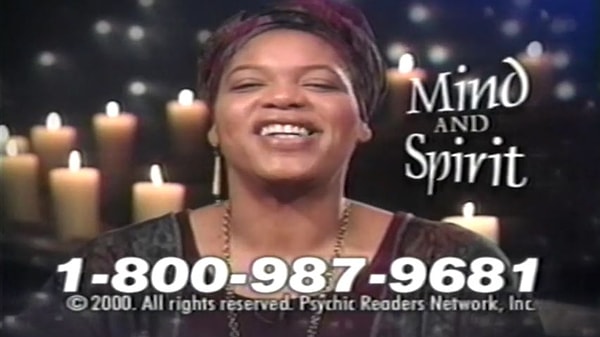
Courtesy of Psychic Readers Network
Who Was Miss Cleo?
We all thought that we knew what was happening. Cleo's accent, for example, was quite obviously fake. Speak to a Jamaican or someone from the Caribbean Islands, and they would laugh and tell you straight out: that woman was as American as apple pie. The rest of the story was just as clear. But there was so much more going on behind the scenes--and not just fraud and the accompanying drama--no organized crime, cocaine, and giant egos clashing. This was something different--something the American public rarely saw.
Miss Cleo told a lot of stories about her past. She'd claim that she was a trained shaman from Jamaica. She told many of her friends that she came to this country at an early age. On her website, it said that she was from Trelawney, Jamaica and that she had grown up there. She was actually born in Los Angeles to a pair of well-to-do parents, who sent her to an all-girls boarding school. Her real name--at least we think it's her real name--is Youree Dell Harris. There are high school yearbook pictures of her with a bob, wearing tight white t-shirts. But this was a time before background checks and reliable records. Even the government had a hard time finding her birth certificate. So like many of her peers, she may have found a way to manipulate the system and take on a different identity.
There are a lot of gaps, lies, and rumors. We don't know much about her early adulthood. Shortly before she began working with PRN, she started a theatrical company in Seattle. She'd hold plays out of the local African American community center, where she'd promise to produce blockbuster hits and make big money for everyone involved. She did reach a level of marginal success, but her final play, Supper Club Cafe flopped. in 1997, she received a check to pay the actors, and instead of doing so, she took the money and left town. This story has often been used to show that she was dishonest. She did con people, and she probably was flawed in some fundamental way. But we are all more than the sum of our worst actions, and there's so much that we don't know about what went on behind the scenes. That one incident--and even what we know about the company itself--isn't enough to make an accurate judgment about her character.
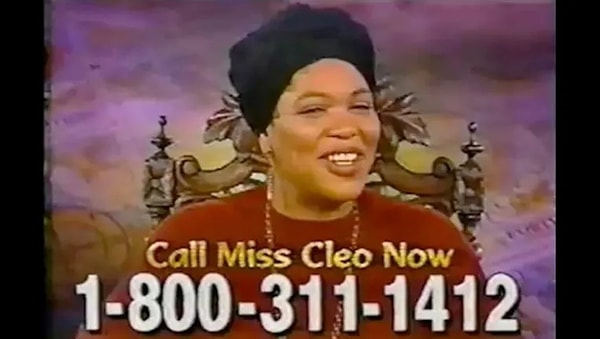
Courtesy of Psychic Readers Network
Many of those close to Cleo claimed that she was the victim of abuse, and this does ring true. In the documentary, they told a story about incidents with a family friend who would show up at her house as a child. She also said that she contemplated suicide as early as 7 years old. It was all twisted truth; everything about her was, and that's probably one of the few constants in the narrative, but she seemed to have developed a mental illness that can come on as a result of her trauma. It may also explain why she had a habit of lying.
At some point, she began affecting a Jamaican accent and swearing up and down that she was in fact a shaman from the islands. Cleo became a winning persona--a believable practitioner of the occult--no nonsense, a bit vulgar, and definitely feisty. It worked, and it's what allowed the PRN to succeed. But it wasn't something that she devised to con people out of their money. It was a split personality, the result of mental illness, and it was one of several she exhibited over the years.
Her disorder is wildly complex and diverse. It's commonly known as split personality disorder, but that term is obsolete. There's a lot of debate within the psychological community about how it works and what to call it. It's very rare for the American public to see it displayed on television. Movies like Sybil are pure fiction. They're not accurate portrayals in any sense of the word. Sometimes it's spoken about in talk shows, and there are a few documentaries, but they're laden with all sorts of falsehoods, and they couldn't possibly encompass the wide range of symptoms and the other disorders that can come along with it. Essentially what will happen is a person will experience something unbearable. Some people who undergo the worst kinds of trauma--holocausts, wars, or decades of abuse--will become someone else in order to escape the pain of what they went through. It's a coping mechanism, and in many ways it's healthy. They don't have to carry the burden that would destroy your typical shell-shocked soldier. They can be another person--someone happier, smarter, and well-adjusted. Pathological lying can also be used in this way. Some people also exhibit memory loss. They'll blackout their trauma. They might hallucinate or revert to a childlike state and relive what happened. There's no telling what Cleo faced. She didn't seem to have a proper diagnosis, and the mental health community would've had to struggle to give her one. But people were aware of what was happening. She was too in a sense. She would attribute it to her work as a medium.
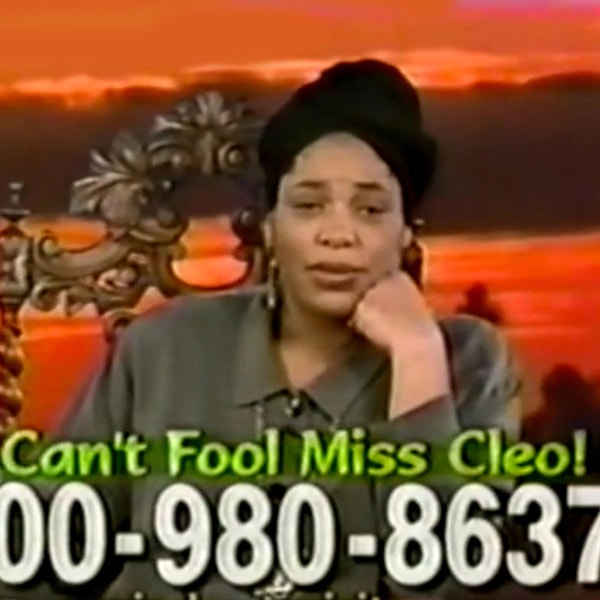
Courtesy of Psychic Readers Network
Cleo had an interest in the occult before she began working with PRN. She knew how to read cards--which is an acquired skill--and she was familiar with magick and other forms of divination, also known as fortune-telling. Everyone she knew--people who saw her on a regular basis for years--believed that she did not set out to con anyone, and she may not have. By all accounts, she was a real practitioner. That might not make sense. A psychic is a psychic, right? They're all seen as scam artists. There doesn't seem to be much of a difference between someone obvious like Sylvia Browne and John Edwards and the ladies who flip cards over on a table.
Whether psychism is real or not, Sylvia Browne and John Edwards used stereotypical, modern techniques devised specifically by cheaters to fool the audience. They'd cold read, fish for names in the crowd, and tell people what they wanted to hear. We all want to believe that our dead loved ones are looking down on us, so they confirmed that every chance they got. It's all fake, but there's a completely different side to these practices. In much of Latin America, Africa, and parts of Asia, magick and divination are an everyday part of life. There are practitioners with lineages stretching back centuries, another parlor or a witch on every street corner--leaders within the community. They are not all out to cheat you out of your money, and they are to be taken seriously--not necessarily because they have some sort of mystical power, but because their traditions are a staple in their religion or their culture as a whole. In civil society we respect people's beliefs, and who are we to tell the village shaman that he's full of it while we're bulldozing his land? It might be true, but it's not our place. There's also modern movements, like Wicca, which have now become major religions. In China, magick, astrology, and I-Ching--their divination system--are all established religious practices, and the mainstream public takes part in them. This is also the case in Africa. There's no cold readings, no fishing through the audience. There's real lore. They take a lifetime to learn it, and they believe in it, body, mind, and spirit. That was also the case in pre-modern America where they'd practice Appalachian Conjure in the South or Pow-wow in Pennsylvania. Those traditions are still around in some form or another to this day. To them, the occult is a traditional religious practice as valid as any other religion.
Cleo claimed to be a Voodoo woman. Whether or not she subscribed to the actual religion is unclear. Many people integrate practices from different systems, borrowed from indigenous groups, European folk magick, and Wicca. But within that faith, ancestry is very important, and she did in fact have an Afro-Caribbean heritage. At some point, her ancestors had similar beliefs. That allowed her to legitimately claim that she was part of an ancient line, which matters quite a bit to those who give credence to her belief system. Behind the scenes, that was who she was. She kept an altar in her home. She'd light candles, cast spells, and work as a medium. She spoke like someone that had spent years studying. She actually thought that she could contact spirits and working with the other side, and she wanted to help people. Things might not have turned out that way. But she didn't rip off her wig, grab a cigarette, and revert to an American accent the second they stopped filming her commercials. She was a real Voodoo woman--as real as any other, and this is an important distinction. Sylvia Browne laughed at the audience. She reportedly told one of her many ex-husbands that if her followers were dumb enough to believe in what she was saying, they deserved to be conned. She was a convicted fraud. She'd intentionally come up with schemes. She fooled investors into buying into a fake gold mine and ran off with the cash. John Edwards is a textbook example of a conman, using techniques straight out of a fake psychic textbook, and he's not even trying to hide it. He learned how to lie so he could make a bunch of money. That's how he earned the title of the biggest douchebag in the universe on South Park. Cleo was sincere. They were not. The result was the same, but it's still an important distinction.
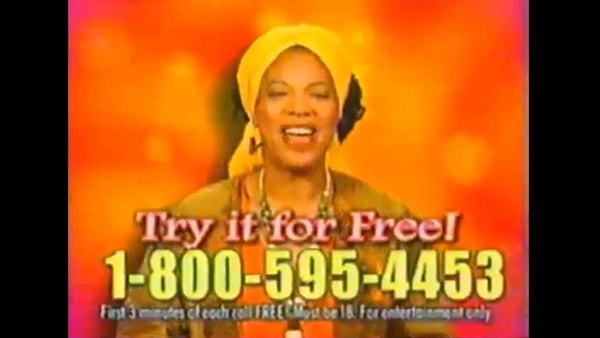
Courtesy of Psychic Readers Network
The Psychic Readers Network
In the late 90s, Cleo saw a commercial for PRN. They seemed to be failing. They'd just lost their spokesperson, and the woman they replaced her with was seen as a joke. Cleo could not stand it. She was already reading tarot for their network, so she decided to step up and contact them, and they agreed to give her a shot.
She was paid less than $2000 for her first commercial, and it made them millions. They had her working as a contractor rather than an employee. It's like Doordash or Uber. They can pay by the gig instead of offering her minimum wage because she was seen as an independent entity offering the company her services. She did seem to make more than minimum, but she was not raking in the cash. She did not get rich. She wasn't a millionaire. Her life couldn't have been more mundane. She was just an actress or a spokesperson for a larger enterprise. The company itself was owned by a couple named Steven L. Feder and Lou Thomas Trosclair, who just sold their Ft. Lauderdale home for $14 million. They were seen as the real problem. They came up with a con. They were hurting people, playing dirty with their books, and they were shameless about it.
The way it worked was simple. The idea was that if you called their hotline, you would be calling Miss Cleo. Instead, they ran ads for psychic readers in classifieds across the country, promising gig work for anyone willing to sign up. The job interviews were a total sham. Someone would come in, hand over their legal documents, and they'd be hired. There was no screening process, no test for legitimacy. Most of the employees just wanted a job. They would often work at home. They'd call a number using their landline, sign in to the network, and calls would be routed directly to them.
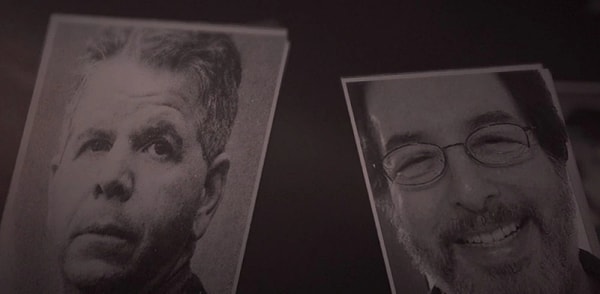
Courtesy of HBOMax
Since the hotline charged by the minute, readers would earn a commission based on how long they were able to keep callers on the phone. It was well below minimum wage, maybe a few cents a minute at most. Cleo herself spoke out about inequity. She saw it as tragic, and it was. They'd learn tricks, take their time, and keep people talking. There would long pauses and attempts to start lengthy conversations. If they couldn't maintain an average call time of 20 minutes, they would be placed at the bottom of the queue, and more lucrative psychics would receive priority.
Nobody was actually trained in divination--at least not by the company. It can take years of practice and study to learn, and they weren't about to pay for their courses. Instead, they were given a basic script with simple card meanings, form responses, and protocol. If a caller said something, there would be a proper way to respond to it. There's a science behind the process. Anyone who has ever entered this world knows that people come to psychics when they are desperate and they have nowhere to turn. They could be on the verge of homelessness, stuck in an abusive relationship, or struggling with anxiety. They're concerned about something, and they have their own assumptions about the situation. They're not going to give up on those ideas easily. If they think someone is cheating, no psychic is going to be able to reassure them. If they have a habit, a mental illness, or some type of maladaptive behavior that's destroying their life, they're going to do what most people do in that situation: deny, deny, deny.
You're never going to keep someone on the phone if you slap them in the face with the truth. They'll get offended. They'll say it's not real, throw a fit and swear off psychics. It's a reader's job to find out what a person wants to hear and what they're willing to believe. They'll put on a show, cry out to spirits, and make it all seem credible. They might glean clues from a conversation, and when someone calls in repeatedly, they'll take notes to give them a more personalized experience. It works because people want it to. They're in pain somehow. They're so desperate that they're willing to spend every cent they have--anything to relieve whatever is plaguing them. They would call at their worst when they truly needed someone to talk to, and the company would take them for everything they had.
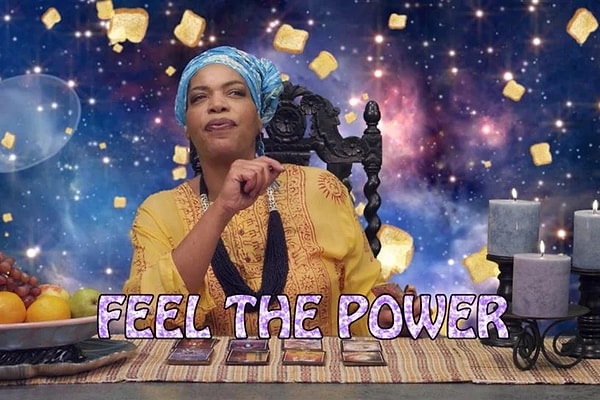
Courtesy of Psychic Readers Network
What Happened to PRN?
Behind the scenes, Psychic Readers Network was a shameless cash grab. They'd do anything and everything to collect false debts and sue. Some hotlines are known for going to the authorities and filing criminal charges. They'll setup entire systems to protect themselves, find victims, and make them pay. We don't know exactly how that worked, but it was enough to tip off the government that something was going on.
There was a series of settlements and fines. They were expensive, but it wasn't all that serious. Cleo was let off the hook because she wasn't actually involved. As far as everyone was concerned, she was an actress, and she had her own grievances with the way they handled things. She claimed that she was owed money, that she had a bad contract. She even shared her contract with the authorities, and they reportedly sympathized with her. But she was aware that they were conning people. In that way, we can hold her somewhat accountable. She never spoke up. She didn't turn them in, and she continued to promote them.
Unfortunately, the owners were able to salvage the company. To this day, you can still contact them, and you'll be connected with a gig worker armed with a booklet, a set of protocols, and the incentive to keep you talking. They've adapted a bit. Video chat is the new standard, but their model hasn't changed much, and they're still as dirty as sin.

Courtesy of Psychic Readers Network
What Happened to Miss Cleo?
When people started talking, and Psychic Readers Network went viral, Cleo was labeled as a con artist and a fraud--the worst of the worst. Sylvia Browne made told people that unicorns were real. There's a paper trail on her going back decades. But she commands a level of respect that Cleo couldn't possibly have hoped for. Cleo was the occult bottomfeeder, and it hurt her. She'd have heated interviews, hate mail, and death threats.
Out of shame and fear, she shuttered herself in her home and refused to leave. Her friends had to drag her out, invite her to parties and help make sure that she was OK. She ended up becoming very active in her local LGBTQ+ community. She was a closeted lesbian, and she knew that she had a voice, so she decided to use it. This was in the mid-2000s when states were rushing to pass laws against gay marriage. Activists were out in droves, knocking on doors, passing out voter registration forms, and running telethons. She was in the middle of all of it, holding speaking engagements and marching in pride parades.
She eventually met someone, and they lived together for some time until she was diagnosed with cancer. She passed away in 2015 surrounded by her loved ones, leaving behind a legacy of rumors and fraud. It hurt her. She probably never recovered from the bad publicity, but she did find moments of happiness.
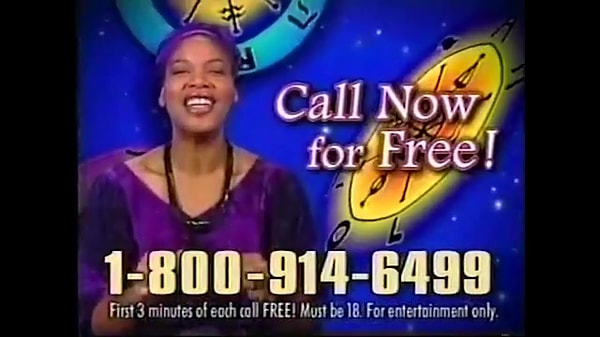
Courtesy of Psychic Readers Network
What Can We Learn From Miss Cleo and Psychic Readers Network?
PRN posed a real threat to the public. It might seem harmless, just a quick, very expensive voice on the other end of the phone. It could break your bank account, but other than that, they didn't seem to be hurting anyone. But what about callers who are contemplating suicide or in danger? What if they need actual expert advice?
People would call to see if they were sick instead of visiting a doctor. Battered women would check to see if they should leave their husbands. They might ask for a home remedy and choose mugwort over chemo. These conundrums come up often, and it's one of the main criticisms against occult and new age practices. Doctors see it all the time. In the public eye, there are several notable examples. Steve Jobs, for instance, chose the power of positive thinking over cancer treatment, and now he's no longer with us. Limbs have been amputated because of infections left to fester. Children have passed away because their parents chose magick and psychism over western medicine. Things can get ugly, especially when it comes to serious health concerns. When you're terminal, and you know it, magick and divination suddenly become an option.
Then there was the exploitation. How many families went without because their kids called a hotline? What about those on the other end of lawsuits, and where was the money coming from? Readers in the documentary would talk about impoverished individuals, people who needed to pay for rent for food--even the homeless spending every single cent they had to talk to someone reading from a little booklet. They didn't even necessarily want answers. They just wanted someone to talk to, and that kind of relief can be addictive--like the mind-numbing effects of a drug. People would treat these hotlines like a gambler in a casino. They'd get anxious and scared. They'd worry over every little thing, or they'd move from one catastrophe to the next, consulting with psychics at every turn. They would lose their homes. They would go without, and their families would suffer because of it. PRN depended on people like this, who couldn't help but pick up the phone. They wanted readers to develop a rapport so callers would come back, talk about their lives, and build an intimate connection with the voice on the other end of the line. They fed into that addiction like a dealer peddling to a group of junkies.
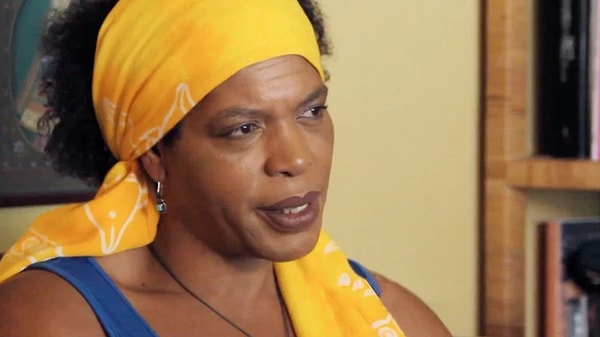
Courtesy of HBOMax
The obvious answer to this problem is to avoid psychics. It's as simple as that. But what about people who see the occult as a faith-based system? What about cultures where it's a part of everyday life? In some regions, you simply do not make a life decision without consulting with someone. In those instances, the responsibility is in the psychic's hands, not the person seeking them out.
The profit motive can be a problem. Psychics typically want to help people, but they also have to make money. This is especially the case for those who practice full-time. They'll devote their lives to divination and make it a career. If that can't be done without a measure of integrity, then it's not a viable career path. Find a way to do it without exploiting or hurting people, or buck up and find another job.
There are paid psychics who act with integrity. They don't drag things out. They might charge a flat fee. They could drop clients who they feel are taking their services to an unhealthy place, but they can also cause damage without intending to. There's no way of knowing who is on the other end of the line or what their situation is, and bad advice can kill. The best way to handle this would be to refer clients to professionals--doctors, crisis lines, domestic abuse shelters, and mental health services. People in that field are the only ones qualified to take those calls. They have ways of keeping the caller safe, and they can bring in the authorities if necessary. Once things start crossing the line, and the conversation turns serious, have a list of numbers that your client can call. Learn about social services, find hospitals, and do some digging to find out how to contact their local police department. Don't give up. Don't let things slide. Be sure that they're OK. Never give out medical advice. In many regions, there are laws against doing so simply because so many people have gotten hurt. If someone tells you they are sick, make it clear that they need to find help. Do the same thing with mental health. There's always a line of schizophrenics out the door, ready to have their delusions confirmed by psychics. They spend decades attributing their mental illnesses to metaphysics, and psychics are usually right there feeding into that mindset. Stop. That's just prolonging their pain and keeping them from the treatment they need. Do not buy into the myth that schizophrenics are mislabeled mediums or something similar. They're not. There's mountains of evidence to prove that, and the sooner the community can admit that the sooner they can heal. Take substance abuse into consideration as well. Addicts are notorious for avoiding treatment. If you think they might have a serious addiction, say so, and give them the resources they need to find help.

Courtesy of Psychic Readers Network
Know that the resources needed to help your clients are not catch-alls. They won't necessarily swoop in and help somebody, and they often do more harm than good. Learn how to navigate the system in different regions. Find ways to get them mental healthcare. Tell them where they can find a hospital or a clinic. Understand that if you send the police to someone's house, they could get hurt or forced into worse circumstances. It might be better to go with other options.
This isn't hard to learn, and there a lot of psychics who integrate community resources into their practice. We also have to address the desperate individuals who call compulsively. They don't need to spend $12.99 a minute to talk to someone. There are trained professionals who will do that for free, and they can do a lot more good than a psychic. If psychics continue to string them along, they're just going to hold them down.
It's also important to find venues that don't require you to sacrifice your morals. These networks are complete bunk. They're run by investment firms, greedy capitalists, and con men. They hurt people, and they do not care. Many psychics turn to social media, like Facebook or Twitter instead of relying on them. There are groups and forums where you can offer paid readings. You can also look to your community and network in person. Finding clients is simple. People enjoy readings. They seek them out, and they take stock in them. There's no reason to exploit people for the sake of visibility, and trying to do so will get you nowhere. You're no more likely to find clients if you sign up for some shady service. The best strike out on their own, and they make it work.
Keşfet ile ziyaret ettiğin tüm kategorileri tek akışta gör!

Send Comment